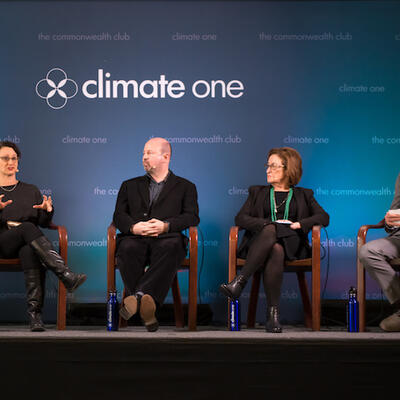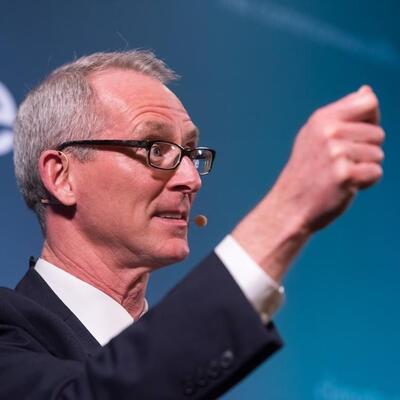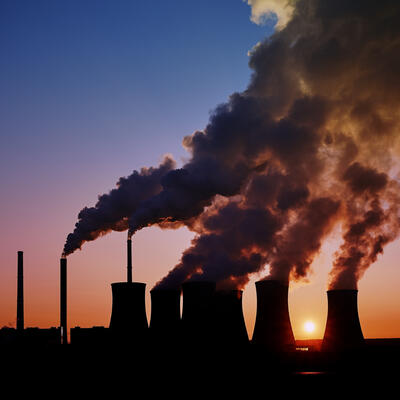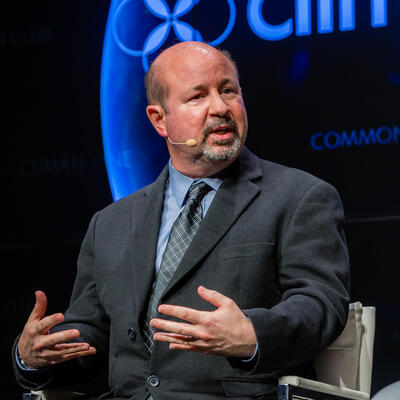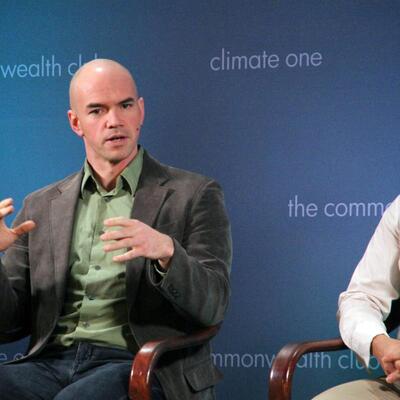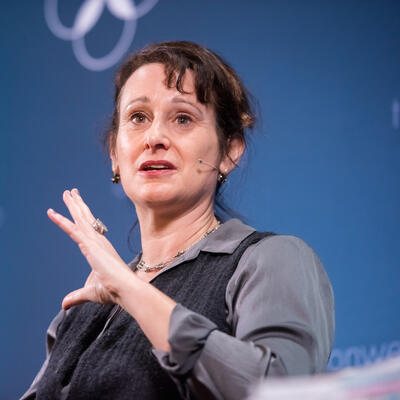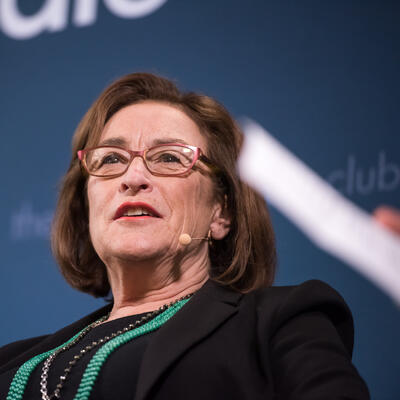
Selling the Science of Climate Change
Guests
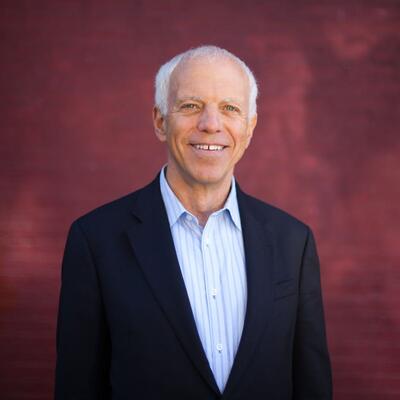
David Fenton
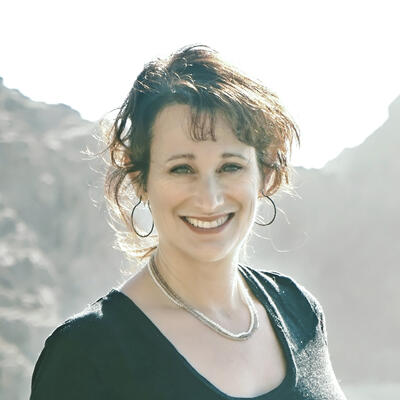
Renee Lertzman
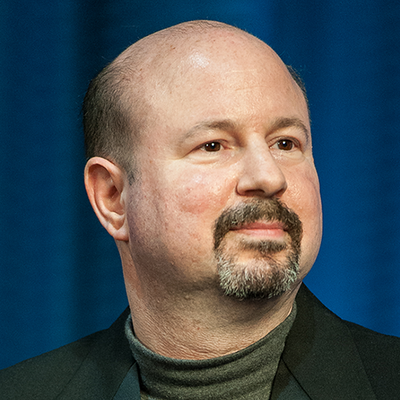
Michael Mann
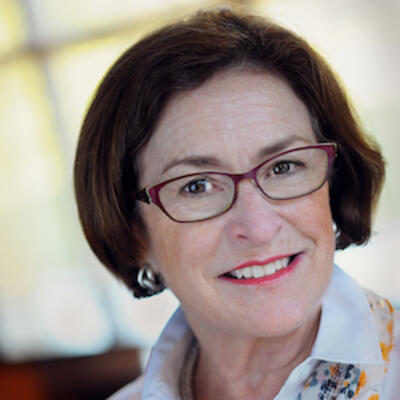
Cristine Russell
Summary
The scientific consensus is that human activity is cooking the planet and disrupting our economies. Yet many people still don’t believe that climate change will affect them personally, or they deny the urgency of the problem. Can better communication help sell the science of climate change? “Only the repetition of simple messages changes public opinion and affects the brain,” says David Fenton, a four-decade veteran of PR campaigns for the environment, public health and human rights. “If you are not using effective messages that you repeat, repeat, repeat and are simple, then you get nowhere.”
Full Transcript
Announcer: This is Climate One, changing the conversation about energy, economy and the environment.
The facts about climate change have never been clearer. So why has communicating them to the public been such a challenge?
David Fenton: Facts don't work by themselves. Facts only really work when one, they’re embedded in moral narratives. Secondly, facts don't work unless they're embedded in stories. And third, the brain only absorbs messages that are simple and that are repeated.
Announcer: Does the climate movement need to think more like a PR agency?
Renee Lertzman: What we really have to do is take a more integrated approach that recognizes that fact and reason and rationality have to be integrated with emotional intelligence.
Announcer: Selling the Science of Climate Change. Up next on Climate One.
Announcer: Does the climate movement need a campaign manager? Welcome to Climate One – changing the conversation about energy, economy and the environment. Climate One conversations – with oil companies and environmentalists, Republicans and Democrats – are recorded at the the Commonwealth Club of California, and hosted by Greg Dalton.
I’m Devon Strolovitch. The scientific consensus is that human activity is cooking the planet and disrupting our economies. Yet many people still don’t believe that climate change will affect them personally. Or they deny that the problem is urgent enough to take action that would disrupt their lifestyles. Can better communication – maybe in the form of an PR campaign – help sell the science of climate change?
In the first part of today’s show, Greg Dalton talks to David Fenton, the founder and chairman of Fenton Communications. Over four decades, David has pioneered the use of PR, social media and advertising techniques to advance social change. Some of his best-known campaigns include stimulating the rise in organic food sales, saving swordfish from extinction with a coalition of top chefs, public health campaigns against tobacco and endocrine-disrupting chemicals, and many others.
David was formerly Director of Public Relations at Rolling Stone magazine and Co-Producer of the No-Nukes concerts in 1979 at Madison Square Garden. Here’s Greg’s conversation with David Fenton on selling the science of climate change.
Greg Dalton: So you helped the scientist, James Hansen create his TED talk. So tell us how you helped him create some drama around his TED talk and how that gets to the need to communicate climate more effectively.
David Fenton: Well, part of my job is to help scientists speak English and acceptable accurate drama. So I was hoping the great Dr. James Hansen with his TED talk a few years ago. And he said to me “Well David, I really want to explain to the audience that the earth is so way out of energy balancers so much more energy coming into earth and is able to go back out to space anymore.” I said “Okay Jim that sounds great. How much is it, how bad is it?” He said it's really a lot. He said “It's a quarter watt per square meter.” I said “Jim, that doesn't sound like very much. I don't think people will get that.” And Jim got angry at me and he said “What do you mean? There’s a lot of square meters on the earth.” I said “Well, do you think you could figure out another way to express that that would be accurate but that would convey why you're so concerned a little bit more.” So he took out a calculator and crunched a bunch of numbers and he said “Oh, it’s the energy equivalent of 450,000 Hiroshima size atomic bombs going off in the atmosphere every day.” I said “Wow, now I think people will get it Jim. That's a lot of energy we’re trapping isn’t it?” So same facts, different narrative, different effect.
Greg Dalton: And scientists have led with the facts for many decades and it hasn't been particularly effective. Why are leading with facts have not been an effective communication strategy for people concerned about climate?
David Fenton: Well there’s a number of issues there. Facts don't work by themselves. Facts are important and they’re essential and they’re the only ethical thing to communicate, which is very important. But facts only really work when one, they’re embedded in moral narratives. People are moral actors. They have different moral systems. So you have to match the fax to that. Secondly, facts don't work unless they're embedded in stories. The brain processes stories much more than it does isolated facts. And third, the brain only absorbs messages that are simple and that are repeated. This is the essence of cognitive science. It's the essence of communications theory. So if you are not using effective messages that you repeat, repeat, repeat and are simple, then you get nowhere. And we have a great practitioner of this now I'm sorry to say in our president. You know make America great again. I'm sorry but it works. You know, in our community in the NGO activist science legal community. We don't like simplifying things. Things are complicated. We hate repeating ourselves. So the things we don't like are what works. So we need to deal with this.
Greg Dalton: Saddam, 9/11. Saddam, 9/11 well how many times did we hear that. And even though it wasn't true lot of people it sticks.
David Fenton: So, you know, Goebbels of course said that if you repeat the big lie often enough it becomes the truth. Well for those of us interested in communicating the truth again, it’s the repetition is the key issue. So this is another reason why scientists haven't succeeded at this, they tend to be often poor communicators and make things too complex. They don’t like repeating themselves they don't tell stories they tell facts.
Greg Dalton: They lead with what they don't know not what they know.
David Fenton: Right. They stress uncertainty in ways that the public doesn't really grasp. But it is a tough problem communicating climate change is a very tough problem. You know, it doesn't trip the normal hormonal responses we evolved to protect ourselves with. You can't see it, you can't taste it, you can't smell it. It appears to be in the distant future. So, so communicating it is a challenge there's no question about it. But the other thing that I think is happening is that in the old days journalism had more power and it has much less now. It's still very important, but it's not enough anymore. The media is very fragmented. So if the only thing that works to change the brain and public opinion is lots of repetition. You can no longer achieve that just by getting people in the news and on television because it's here today and gone tomorrow. So we have to devise and use the new technologies that allow you to deliver messages to people repeatedly and unfortunately there’s very little of that being done on the climate issue.
Greg Dalton: For a lot of people the climate narrative started in 1988. It was a hot summer in Washington DC, Jim Hansen, the NASA scientist testified before Congress. New York Times front-page story the next day and I did an interview Jim, he said, he thought he did his job. He told the responsible people running the country there is a problem and he went back to his lab and thought that they would solve it. That was naive. What really happened?
David Fenton: Well, Jim's a hero, you know, if there is a history he will be a hero. But that's the problem. See, this is the enlightenment fallacy. If you come from the sciences, the law, the humanities, the Academy. The basic worldview, it’s a Cartesian worldview. It's from long, long ago, is that, you know, people are logical and you tell a fact to somebody in power quietly and a light bulb goes off in their head and the world changes. Well guess what, it doesn't work that way anymore. I'm not sure it ever did, but it certainly doesn't work that way now. Only campaigns work. Only the repetition. I'm repeating myself I know, of simple messages changes public opinion and affects the brain. You know, asked the Russians they bought the delivery of a bunch of simple divisive messages on Facebook for very little money and they helped sway an election. And as for the climate community and it’s larger than that the NGO community in general. A lot of the philanthropic community. All these people do a lot of amazing great things, but when it comes to marketing when it comes to selling ideas generally and unconsciously people look down on that's. That’s that dirty, slimy, manipulative stuff that the bad guys do. And I think we need to embrace that you can de-manipulate. You can un-manipulate, but you can't do it ignoring cognitive science and how the brain actually works.
Greg Dalton: So the cognitive side you mentioned that our brain is not wired to respond to an invisible gas. But if there's a man with a gun or a tiger in the woods, then our reptilian brain is activated. So what's the solution other than repetition what’s the solution? There’s have to be more hope rather than fear?
David Fenton: Well I think like most things in life it's not one of the other. The question is what's the right balance, it’s in the mix. So not enough empirical work has actually gone into this to really figure this out. But my strong suspicion is if we did that work what we would find is that the message has to mostly be hope. But it also has to have some fear so you have to have hope because otherwise people's nervous systems shut down contemplating what is in effect the death of our species and who wants to think about that. In fact, psychologists have theorized that a lot of people the mental pathways they use to think about climate change are the same mental pathways we used to think about death and dying and who wants to think about that. So you have to do lead with hope and there is a lot of hope. This is a solvable problem if we hurry up, but if you don't also explain to people why we have to hurry up the fear factor you will not get the social mobilization that we need in time to save ourselves. You know a lot of people don't understand that the carbon and methane that we're emitting today, especially the carbon dioxide will stay in the atmosphere for thousands of years. And so the atmosphere is already full, you know, the mental frame image of pollution in most people's minds is there’s a smokestack the dirty stuff goes up and eventually it comes down. Not true in this case. So that's why we are running out of time. So we do have to have a mobilization of opinion. And, you know, it’s interesting we have so little time but we’re not focused on this. And when you think about it, public doesn't talk about climate change it’s not on people's minds very much.
Greg Dalton: It's complicated it’s politically divisive and it's kind of a downer so people –
David Fenton: And also you don’t really come across it that often. For example, the network television news departments with rare exceptions will not say the words climate change or global warming. No matter how many wildfires crazy high strong hurricanes we have, no matter how many floods. You will not see this link, or even the words mention climate change on the morning or evening news shows. So how are people supposed to find out about it? And the environmental groups do great work. Thank God they're suing Trump. Hooray for their science and their policy work, but they spend very little percentages of their budgets on actually reaching the public. That's the missing link. So part of why people don't talk about this is that they don't run across that.
Greg Dalton: Also there’s a narrative on the right and Jerry Taylor, who you know who has worked at the American Legislative Exchange Council and the Cato Institute says that the right often looks at enviros as crybabies and crying wolf and there's always, you know, the world's gonna end going back to Paul Ehrlich, population bomb, didn't happen. You know, you people on the left are always running around saying the world is gonna end, it doesn't. Things you don't foresee, technology, et cetera come along. So we don't listen to you lefties saying, you know, you don't have credibility.
David Fenton: Yeah. But remember, the fossil fuel industry for decades has had an intentional confusion and disinformation campaign. And it was very successful. I mean, for example, even today, according to the Yale project on Climate Change Communications, only 12% of the American public know that there is scientific consensus that humans are changing the climate and it's dangerous. Only 12%. Now, when you think about it really that's not surprising, one that was the strategy of the fossil fuel industry to spread doubt about exactly that scientist don't agree. But there is another reason for those –
Greg Dalton: Taken from the tobacco company.
David Fenton: That’s right. But I would have to say that we are all also culpable in this problem and we need to face up to this, it’s also only 12% because we don't reach the public. We have no project at any scale worth mentioning to actually explain to people that the scientists agree and the research at Yale shows very clearly that in any population when you show them that there’s scientific consensus support for action goes off the charts. So this is why I'm actually still optimistic even though I hang out with climate scientists and I don't recommend people do that because it’s hard to be optimistic when you hang out with climate scientists. And you can understand why they are so freaked out because of what they know. I'm optimistic because we have never really tried to reach the public consistently and systematically at scale. And I believe we can get them on board and I don't think we can succeed without them.
Announcer: You’re listening to a Climate One conversation with David Fenton about selling the science of climate change. Coming up, Greg Dalton learns more about David’s elevator pitch for climate.
David Fenton: Don't talk about the planet. That doesn't appeal to the public. And besides the planet will be fine. It will recover in geologic time. We just won't be here. This is about humanity.
Announcer: That’s up next, when Climate One continues.
Announcer: We continue now with Climate One. Greg Dalton is talking about selling the science of climate change with David Fenton, founder and chairman of Fenton Communications, and a four-decade veteran of public relations campaigns for the environment, public health and human rights.
Here’s your host, Greg Dalton.
Greg Dalton: Are you sincerely optimistic or do you just say you're optimistic because you think you have to be express optimism to be effective?
David Fenton: No, I’m optimistic. I mean I'm realistic, but it's too late to avoid some terrible consequences. But it's not too late to avoid the word so had we tried to really get people to understand the urgency of this in a way that they can understand and that actually reaches them repetitively and failed, I'd be really depressed. But we haven't tried it yet. I mean imagine, I know a lot of people in the environmental community who think we should not talk about climate change. We should just say clean energy isn’t it great –
Greg Dalton: Don’t use the dirty C-word.
David Fenton: Look at the polls, everybody supports clean energy. Well that's true. But we're not going to get the level of economy-wide mobilization that we need to transform the energy system rapidly in time to avoid the worst consequences without public understanding and support. The notion that you can solve this without people knowing about it or talking about it, you know, that's an elite fantasy.
Greg Dalton: And we live in a time of populism where people question and distrust elites whether it's financial elites, political elites, scientific elites there's an anti-intellectualism and anti-science stream in our country these days. It is bigger than the Trump administration.
David Fenton: There is and, you know, it’s fueled by some very nefarious forces including in the media. But I think that we can reach people but we don't have a project to do it. That's not what our community does. You know, the great linguist Professor George Lakoff, retired now from UC Berkeley. He has an interesting theory about why this is. So Lakoff says we come from the humanities, the sciences and the law, but our enemies go to business school. And they learn how the brain works and in order to succeed in their careers they have to learn how to successfully market products and services to their customers. So I ask people how much do you think it costs to buy a 30-second television ad just in Washington DC, on CNN or Fox just in Washington DC. And most people say $50,000 or $100,000 and I surprise them by explaining to them that it's $1000. Often it's $500, people are amazed. And this is what I'm preaching. It's time to think this way because otherwise we’re basically practicing unilateral disarmament.
Greg Dalton: So Al Gore did that after his Academy award winning film in 2007, An Inconvenient Truth. And he -- what, couple hundred million dollars behind Nancy Pelosi, Newt Gingrich, unusual suspects sitting together on a couch in a place saying we can solve this in a bipartisan way. Was that an effective campaign, was it an effective use of millions of dollars?
David Fenton: A few answers to that. So one again only repetition works. That was 2007. So it's been 11 years we haven't done anything like this since. I would say also that in hindsight it would've been good, perhaps to spend more that money on explaining to the public more simply, what's at stake and how this works. See I think people can understand it, but look at our language if we talked about, you know, we’re trapping heat on earth so it's getting hotter and the ice is melting and it’s gonna flood our cities. That's not hard for people to understand. But even now, the community talks about this issue every which way. It's the Tower of Babel. So the other side has its simple messages that they all use and we have complexity. So who's going to win that?
Greg Dalton: I actually think that a lot of people see it in their gardens they see it in the weather. They see it around the country. Of course they know about faraway places that they don't really know or care about the poles, et cetera. But what they don't know is what they can do that will make a difference.
David Fenton: Well here's the figures. So 70% of the American public agrees that climate is changing. Only 51% believe it's humans, but I think perhaps most importantly, only 20% think it's urgent. So the urgency of this issue has not sunk in to this culture. It has not. And that's our job because it's the most urgent thing we face, you know, way I like to talk about this is I'm interested in a lot of other issues but we won't get to solve those issues. If we don't solve this one in a hurry.
Greg Dalton: Right. Hank Paulson came to Climate One and said, as bad as the financial meltdown was, a group of people could get in a room and had the tools to put out that fire. They printed money they bailed out the banks, you know, it wasn't pretty. You can debate it, but they had the ability and the tools to do it. When it comes to climate, when it gets to that that really bad point, humans don't really have the tools to address the climate once we’ve gone over the cliff.
David Fenton: You know, as Dr. Hansen likes to say, once the ice sheet start to move, we don't know how to stop them.
Greg Dalton: Right.
David Fenton: You know, I tell people I work with we should not use the word environment. The word environment means to the public that you care about something other than them.
Greg Dalton: It's separate, yeah.
David Fenton: That’s right. You know, I tell people don't talk about the planet. That doesn't appeal to the public. And besides the planet will be fine. It will recover in geologic time. We just won't be here. This is about humanity. And if we make it about that more and we show people more clearly and simply and repetitively. Look, we’re at a fork in a road. There's two paths basically. So one’s a really beautiful path. You get clean energy, it’s cheaper. The cost of energy will just keep falling if we do it right. You’ll have lots of jobs. You’ll have much more prosperity. You have a stable climate. It's really great. You’ll put a lot of people to work insulating all their buildings putting up solar panels, painting their roofs white. Sounds pretty good, right? The other path is certain decline. Certain economic decline, certain suffering, certain. So why would you allow just a very few people in the fossil fuel industry and their political agents to force us down the road of decline. That's just crazy.
Greg Dalton: If you look at the mobilizations recently, you know, gay marriage was very personal. People started to know someone in their family, someone at their workplace. Why don't they have the same rights as me? Gun violence, you know, Parkland, those students, it’s very human there's a human face to the victims.
David Fenton: That's right.
Greg Dalton: And the villains. #Metoo. There’s a human face to the victims –
David Fenton: And they’re all moral movements, right.
Greg Dalton: And the villains. Climate doesn't fit into that same kind of human face of the villain or human face –
David Fenton: No, it does fit them.
Greg Dalton: The face of the victim is a polar bear not a human.
David Fenton: Well it does fit in. It’s just we haven't done it right. It is the ultimate moral issue. Whether we're going to allow a small group of people to destroy the future of humanity and civilization. That’s pretty much a moral issue. And we’re victims of the fact that we can't change the energy system on our own. Only collective action can do that. You can't blame the victims and everybody, you know, we’re all trying to do the best we can with that, it’s not so easy.
Greg Dalton: So you don’t think we’re complicit?
David Fenton: Well, I don't think we’re responsible, you know, this is an industrial economic planning issue that you can't blame on people. You know, we need an economy wide mobilization. And I'm sure it will happen, you know, I spend more and more time talking to Republicans about climate change because it's essential that we make this a less partisan issue, or we won't solve it. We have to have Republican support. We’re not gonna get all of them but I think we can get quite a few. And I tell them we’re all going to end up on the same side of this issue eventually all of us. It's gonna be like we've been attacked by a foreign power. The problem is if we wait till that's so obvious that the weather has made it so obvious, too late.
Announcer: You’re listening to Climate One. Greg Dalton is talking to veteran PR strategist David Fenton about selling the science of climate change.
Greg Dalton: Some people say that the most prominent messengers are these predictable liberal faces, Al Gore, Leonardo DiCaprio, maybe even Bill Nye. Where are the new messengers who are the messengers you think that are effective to reach people on the right who are NRA members and people who don't call themselves and would never call themselves an environmentalist, who is reaching across that divide?
David Fenton: Well, there are some great spokespeople now from the Republican side that has appeal to conservatives, libertarians, evangelicals. The problem is they're unknown because there is not a project, and there's not funding to help them become well-known. There's a lot of philanthropic money on climate change thank goodness. The problem is that most of it goes into what I call the supply of policy. People fund studies, reports, science, meetings, conferences, you know, opening offices around the world. And that's all great and it has achieved a lot. We now don't lack a supply of policy. We know what to do. We lack demand. But almost no money is going into stimulating demand. And that's what needs to happen. So take for example Dr. Katharine Hayhoe is a Christian evangelical climate scientists at Texas Tech. She is among the best the most articulate plain English speakers about climate change. She's married to an evangelical preacher who used to be a climate denier. And Dr. Hayhoe makes great videos online and you know, maybe they get 35,000 views when they should have 30 million, but there is no funding to help her with that. Or take Jerry Taylor, who you were talking about. So Jerry was a massive climate denier at the Cato Institute. He's an intellectually honest libertarian. His mind was changed by the accumulating scientific evidence. Now he campaigns in Congress for a price on carbon. He should be well known in Republican circles. So think about this. We’re all upset. We have so few Republicans involved. But if you are a Republican in America and you going to your social media feeds, all you're going to see is that climate change is a hoax. That's it. You will get no other information. Now we could change that, you know, it's not just the Russians who can buy ads on Facebook to change public opinion, we could do it too or maybe we can even get Zuckerberg to do some science education on his platform at no charge. But we don't focus on this. So how are we gonna get Republicans on board if we don't affect their perceptual information flow. We could.
Greg Dalton: So the only organizations that have the budgets big enough that you're talking about the big green organizations. Greenpeace, Environmental Defense, NRDC, Sierra Club. What do you think about their messaging and also the business model that drives that?
David Fenton: I don’t think it's so much about the business model. Those are great groups and our community has a certain orientation policy, law, science, that's what we work on, that’s what we spend our budgets on and we should. The problem is that we’re not focused enough on this additional weapon which is public communication. You know, when David Brower ran the Sierra Club in what the 1960s and 70s. So he would buy full-page ads in the New York Times attacking polluters and bad actor politicians. And he would put them massively on the defensive and caused all this media coverage. It was like bomb throwing. You know, you don't see that kind of activity so much now. And I'm urging we bring it back.
Greg Dalton: I saw there's a documentary called Merchants of Doubt, which is based on book by Erik Conway and Naomi Oreskes about communication and the history of climate communications. Bunch of environmentalists in the room and they were all taken by one of the princes of darkness in the film Marc Morano. So what do you know about him and how effective he has been as a contrarian, attacking messengers, reframing and really having an outsized influence on the climate debate?
David Fenton: Well he’s less effective now, but he was effective. He took advantage of a flaw in American journalism, which is overly balanced.
Greg Dalton: The balance bias.
David Fenton: Yeah, you know, reporters want to quote both sides. And in science there isn’t two sides, not when you get to 97%, 98% confidence levels. And the false equivalency is a terrible problem so that you know you'll have some paid horror like Marc Morano who's not a scientist, you know, up on television debating a real scientist. Or, you know, sometimes TV will have a climate scientist debate a scientist whose expertise has nothing to do with climate. So they took advantage of that problem that weakness in journalism and they were very successful at spreading confusion and slowing people down. I’ll tell you something else they did. So as I said before, NBC, CBS, ABC, they don't mention the words global warming or climate. So I've talked to executives there. Here's the reason, they are intimidated by the right and the fossil fuel companies. The issue has become so partisan and politicized sadly that they're afraid to focus on it which is, you know, incredible cowardice on their part.
Greg Dalton: The weather channel will do it.
David Fenton: The weather channel reaches a whole lot less people. But yes, so we could get those people to feel pressured to do this not only pressured from the right not to do it, but we have no campaign to do that either.
Greg Dalton: Right. And journalists have been schooled and trained to not connect a single weather event to climate change. Climate is about long-term averages. So when it's snowing in Atlanta, or there’s unusual weather or they're trained not to connect that to climate because scientists have taught them that.
David Fenton: That's part of it, but I think print journalism actually does a pretty good job of covering climate change, you know, in a group that I helped bring into being called Climate Nexus has done a great job in improving the journalistic coverage of climate change in print journalism. The problem again is that print journalism can't possibly provide enough repetition of messages to actually change opinion that's the conundrum.
Greg Dalton: Documentary films, I wanted to be a documentary filmmaker when I was at the Columbia School of Journalism. Many are made again, this comes from perhaps betraying my Cartesian bias here of facts. Many documentaries have been made about climate. Many of them are about issues, few of them are really character driven and have an emotional attachment. Ai Weiwei did a fabulous documentary Human Flow about the refugee crisis but I can't really, there’s no really emotional connection with any one main character in that film. Lot of them are issue based about solar panels and winds. Why aren't there, where’s the great, the one exception I would say is The Island President, which was about the president of the Maldives.
David Fenton: It’s a good film. And of course, An Inconvenient Truth, which had a big effect.
Greg Dalton: It did. Some people thought there's little too much of Al Gore in that.
David Fenton: It still had a big effect. It just, you know, by the evidence you look at the public opinion, poll history on this issue. Now the movie and the rest of that campaign it had a big effect. The problem is that it sparked a counter-reaction, climate-gate, you know, when they distorted the emails from these climate scientists that was very intentional. And our community didn't keep up the level of activity that Gore was doing with the film and other things in 2007, you know, our activity went down and theirs went up. That doesn't work. But we need to have people in the creative community and the artistic community get much more involved in this issue. You know in the civil rights movement in the anti-Vietnam War movement the artists and the writers and the creative community were deeply involved and it made a big difference. You know we have to pay attention to stories and morality and visualizations and metaphor and language. That's what we need to do. That's the missing part of the war on climate.
Greg Dalton: So last question. You say you’re an optimist. Many climate people I know have some secret or not so secret plan to have a hideaway in New Zealand or British Columbia, or have some guns and food stashed in their backyard. Do you have a secret escape plan in case this communication plan that you’re talking about doesn't move the needle?
David Fenton: There’s no coastal property that's all. No, but I do have a plan, you know, my friend George Marshall wrote a great book. He called it Don’t Even Think About It: Why Our Brains Are Not Wired for Climate Change. And he said, you know, what we should do is tell the world that the North Korean government has discovered a dangerous gas. The North Korean government is pumping a dangerous gas into the atmosphere that is raising global temperatures and sea levels. And everybody would say go bomb those people and you'd say, ha ha it’s climate change or scientists have discovered a giant asteroid is headed towards Earth and it's bigger than the one that wiped out the dinosaurs and it’s gonna hit in 10 years. And everybody would say, you’re not waiting 10 years, you get those missiles up there tomorrow. Knock that thing off course and you'd say ha ha it's climate change. Now are you thinking about it differently?
Announcer: Greg Dalton has been talking about selling the science of climate change with David Fenton, founder and chairman of Fenton Communications, and a four-decade veteran of PR campaigns for the environment, public health and human rights. This is Climate One. Coming up, Greg welcomes a new panel of guests and talks about strategies for challenging climate change denial.
Renee Lertzman: When we’re in social interactions with people we trust and care about, that is absolutely where we can start to see openings in the fixation on the denial.
Announcer: That’s up next, when Climate One continues.
Announcer: You’re listening to a Climate One program about selling the science of climate change. Greg Dalton now welcomes Michael Mann, distinguished professor of Meteorology at Penn State University. Renee Lertzman, a writer focused on the psychological aspects of climate and the environment. And Cristine Russell, a veteran science journalist and senior fellow at Harvard’s Kennedy School of Government.
Here’s again is your host, Greg Dalton.
Greg Dalton: Renee Lertzman, Science is complicated, it's abstract. Do we focus too much on the science and is it more emotional things that people respond to?
Renee Lertzman: Yeah, absolutely. When we're confronted with information that brings up conflict with our beliefs, our worldview, our, you know, ideology whatever, our mind will actually generate incredible strategies to deny, repress and basically avoid our engagement with the situation and with the reality. That's just neurologically, you know, from a neuroscientific perspective that's what our minds do. When conflict is introduced our neural networks are activated and we actually do seek out scenarios that help us stay in alignment with a worldview. And I would add that I think the reason why the messages in the discourse have efficacy and land with people is precisely because there's an incredible difficulty in coming to terms with what’s happening. So, you know, I’m also reminded in the interviews I’ve done with Republicans around climate change, hard-core skeptics, that we see exactly what we’re talking about, a lot of vacillation between recognition and acknowledgment. Somehow, you kind of know that they know deep down that something is up but they can’t allow themselves to go there because of my, you know, identity, affiliation, it doesn’t feel safe or acceptable to do that. Our job is to try to make it more safe, to give one another permission to actually go there.
Greg Dalton: Cristine Russell, has the media done a good job doing that?
Cristine Russell: Well, first of all, the media is a plural word and so l think -- I’ve seen a number of nostalgia pieces recently, remember the good old days of Walter Cronkite where that's the way it is and I think people are really realizing that again a lot of the polarization and the kind of thoughts that we were hearing in that view of the climate denier is because people are getting their information from so many different sources. And so one of our problems if you are in mainstream news media is getting people the information and people are still getting a lot of information from television, but they are also getting it from selected sources of information that reinforce what they think to start with. And so we don't have that collective wisdom and I think one of the challenges for science, for journalism, for any field is how do you get a better, more educated audience on some of these areas of science. And I think the news media has lost a certain amount of trust and people are blaming the media and particularly on the Republican side, the media is as much a target as everybody else. And so we, I think in the news media, in mainstream journalism really have a challenge to try to reach out in a bigger pond and reach other people than just preaching to the converted. So I think we really have a challenge and I think we have a lot to cover in the coming months, that's for sure.
Greg Dalton: Mike Mann, I’d like to ask you about a real legitimate villain perhaps, Frederick Seitz was former president of the National Academy of Sciences, president of Rockefeller University, won many awards and he you write in your book The Madhouse Effect is a founding figure in the art of modern-day science denialism. So tell us how such a distinguished figure went to the dark side.
Michael Mann: Yeah, you know, when people say, you know, well how is it that, you know, somebody that smart cannot get it, cannot get the science of climate change. It's not a matter of intelligence. I think we have to recognize that there are ideological issues at work and in his case, he actually ended up receiving I think something like $70 million from R.J. Reynolds Tobacco to found an institute whose primary function would be to attack the science linking tobacco and human health. And there's a famous saying attributed to Upton Sinclair, it's very difficult to get a man to understand something when his salary depends on not understanding it. And so I think we have to recognize that there is denialism that comes from exactly the place that Renee is describing. Some of it comes from, you know, a self-interested sort of origin as well and I think in some sense that's the more challenging denialism to access and may be convert and turn around because it's so self-interested and it’s so tied to ideology. I don't think any amount of information was going to convince the president, a former president of the National Academy of Sciences that he was wrong about this science. I think he was absolutely convinced that he was right and he was convinced that he was doing the right thing from a political standpoint. I think that's a harder nut to crack. I think it's a part of what we face, the fact that the same interests. Some of the same talking heads who were working for the tobacco industry decades ago denying the connection between tobacco and climate change are today receiving money from fossil fuel interests to undermine the public's understanding and policymakers’ understanding of the science of climate change. And that is, the same argument today is being made actually by the same lead attorney from the tobacco wars is now making the argument that Exxon Mobil, for example, may have engaged in exactly the same behavior.
Greg Dalton: Renee Lertzman, I want to ask you about the power of personal influence, personal experience and perhaps children getting to deniers as a way of changing people's minds that have not otherwise been changed by facts.
Renee Lertzman: Yes there's enough evidence on research that supports the fact that when we have direct experience of issues that influences our perceptions. But we want to be very careful that we don't go too far in that end of the spectrum. So going back to the point around our psychological challenges around engaging with these issues, we do have imaginations. We do have capacity to engage with our imagination but having that direct visceral experience can support that but it's not the full story. So Kari Norgaard's work in Norway. Her book Living in Denial explores how people living in a village where snow is literally not there, people were still in profound denial. So even when things are right in front of us, waters are rising, homes in Calgary are being flooded. People can still absolutely be in denial of what is happening. The point that you mentioned around the influence of children is also becoming more recognized as very powerful. So one organization, the Alliance for Climate Education, that I've been working with actually is focusing on supporting young people to have more effective conversations with their parents. We’re gonna be studying that doing research with some folks over at Stanford. So we’ll be able to see how the conversations that young people, especially teens are having with their parents and how that might introduce some openings. And this also relates to the point around conversation. That when we’re in social interactions with people we trust and care about, that is absolutely where we can start to see openings in, you know, the fixation on the denial.
Greg Dalton: Cris Russell.
Cristine Russell: Well now I was just gonna say, in the smoking, I covered a lot of the smoking wars and the financial influence. But also during that era, there were good studies showing that kids who had learned in school about smoking came home and did have an impact on their parents and wisely so given secondhand smoke as it turned out to be. So I think this anecdotal approach is also used in journalism quite a bit. The anecdotal lead for you tell the story of what has happened to someone. And it can go either way and perhaps one of the stronger ways to get public interest in the issue of the seriousness of the issue is to have more stories coming from places where people are being impacted. And I think one of the surprises in a way is the evidence that is happening all around us, as opposed to, you know, there’ll be more to come obviously. But I think telling more stories about how it's impacting and then bringing the science in to explain how that might be related or precursor and such has always been an effective way I think giving people. And it doesn't happen in journalism. It's always a challenge as a science journalist figure out how to get the science out in the kind of easy dose and not cough medicine so.
Greg Dalton: We did a poll on Twitter. We had 850 votes and we asked the question, “What do you think about human caused climate change?” 61% said it's real and will impact me. 11% said it's real and won't impact me. 12% said it's natural and 16% said it's a hoax. So I want to get to this it’s real won’t impact me because, Renee Lertzman, that’s a form of climate denial, light. We’re talking here about denial which is it's not happening and we hear about that. But there's another thing which is it's happening but it's gonna hurt people far away, or polar bears or people on Pacific Islands. It’s not gonna affect me on a hill somewhere where I’ll be safe from sea level rise.
Michael Mann: I call this the kinder, gentler, climate change denial.
Renee Lertzman: Yeah, exactly. Yeah, Mike’s written about kind of these variations as well. So there's some nice research out there around these variations. You can think of it as rationalization, distanciation where you’re actually putting space or distance between yourself and the issue. These are all very well known documented strategies that we engage in that as you say are not cut-and-dry denial. There's also disavowal where you’re not denying something exist but you're choosing to not actually live in that awareness. You're choosing to go on business as usual. It’s not the same as saying it doesn’t exist. So these again are sort of well known well crafted strategies. And as Kari Norgaard has written about and Mike in your book, that we need one another to actually cooperate to make it real. So it’s not just me as an individual going around having this thought. I need people in my life and I need social interactions who can mirror and reflect that back.
Greg Dalton: And Cris Russell, a lot of the journalism around climate is melting glaciers, drought, bad stuff happening. And is that because good news stories don't get on page one? Is it because they don't have some tension or journalists are predisposed to talk about planes crashing, not planes that land safely, sure. But where are the positive stories?
Cristine Russell: Well, I think the things connecting the dots is the energy picture is obviously the bigger story. What can we do even as that electrician that we’re gonna keep thinking about. You can do something about a problem regardless of whether you know all of the details. And so most of the surveys that are being done show considerable public support for renewable energy, for actually paying more to get cars that run on more efficient fuel. So I think that energy and technology, if it's not exaggerated, provides a kind of counterpoint. And also the speed with which particularly all around the world renewable energy is growing gives people something to do because it is definitely true. Particularly, you know, we've got to stay away from the stories that the ice is up, the ice is down and try to have more context in these stories. But I think more coverage and getting the business and energy reporters to also bring in the science and explain how this more efficient car or electric car I guess which gets to go across the bridge for free here. How that connects to doing something about the environment and about climate change.
Greg Dalton: Mike Mann.
Michael Mann: Yeah, I was just gonna say that sort of the ice is up the ice is down, Andy Revkin referred to that as the whiplash effect. These seemingly contradictory stories that people hear that causes confusion and doubt and potentially denial.
Greg Dalton: Renee Lertzman, facts are confusing. Facts haven’t changed; this mountain of facts haven’t caused us to do the thing that we need to do. Can we just put science and facts aside and deal with something else?
Renee Lertzman: No, absolutely not. But what we really have to do is take a more integrated approach that recognizes that fact and reason and rationality have to be integrated with the emotional reality. I think in the focus on solutions and positive stories we want to be very careful that that's not actually sufficient. It's sort of like what’s called bypassing when you just focus on the kind of rah, rah, here's the good story. You’re not actually addressing the other part of the story and the experience that this is a little overwhelming. It’s a little scary, this is a little confusing. And I think if we do more experimentation in our communications where we -- and this is a place of innovation, we’re all being kind of forced to do things differently right now. To experiment with addressing the reality and the facts and the solutions, but bring in a little bit of that emotional intelligence. Bringing a little bit of that, you know, this is kind of hard or whatever that is and then move into and look what's happening now and I think we'll see a much greater level of receptivity and engagement in the issues if we take that more kind of an integrated angle.
Announcer: Greg Dalton has been talking about climate change denial with Michael Mann, distinguished professor of Meteorology at Penn State University. Renee Lertzman, a writer focused on the psychological aspects of climate and the environment. And veteran science journalist Cristine Russell.
To hear all our Climate One conversations, subscribe to our podcast at our website: climateone.org, where you’ll also find photos, video clips and more. If you like the program, please let us know by writing a review on iTunes, or wherever you get your podcasts. And join us next time for another conversation about energy, economy, and the environment.
Greg Dalton: Climate One is a special project of The Commonwealth Club of California. Kelli Pennington directs our audience engagement. Carlos Manuel and Tyler Reed are the producers. The audio engineer is Mark Kirschner. Anny Celsi and Devon Strolovitch edit the show The Commonwealth Club CEO is Dr. Gloria Duffy.
Climate One is presented in association with KQED Public Radio.
